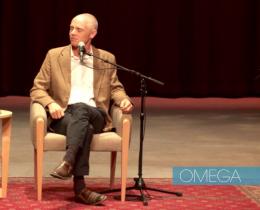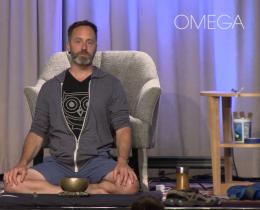Omega: What was one of your biggest lessons living in Nepal working as a psychotherapist for the international community?
Tim Omsted: At any given time, I would be seeing people from probably six or seven nationalities, from all walks of life—from ambassadors to aide providers to local Tibetans and Nepalis to dharma bums, hippies, drug traders, everything. It was quite fascinating.
It was an incredibly helpful way for me to learn one of the most important lessons: no matter what someone looks like on the outside, how successful they are, or how famous they are, we really are just the same. We’re really the same in wanting to be happy and wanting to be free from stress. We’re really all the same in our hopes and in our fears.
That lesson was as profound as any other work I might have done. It was an experiential way for me to be reminded of and get a deeper appreciation for what we call the first noble truth. Literally, the Buddha’s first teaching after he attained enlightenment was that everybody’s life is fraught with some kind of dis-ease or frustration until they’ve contacted that clear and unchanging basis of our mind.
Omega: The Buddha identified craving and attachment as the main cause of suffering. How can we apply Buddhist teaching to help those suffering from addictions, anxiety, and other issues today?
Tim Omsted: I think it would be pretty arrogant if I was to suggest that meditation or Buddhism was a panacea. I know meditators and I know Buddhists who struggle with all sorts of things, including addictions, so we need to be grounded about these kinds of things.
I think one of the principle reasons that people are experiencing so much anxiety is because the surface of the ocean has become so wild and choppy. We’ve gotten lost. And because of that, people are led to all kinds of addictions.
We are running out into the world with our hopes and fears, our thoughts and emotions, trying to find the balance and well-being that we intuit is possible for us. We’re looking for it out in the world, and it never happens.
We’ll never find stable well-being if we attach that well-being onto anything that is unstable and changing. I think the principle cause of distress for all of us is a lack of real familiarity with who we actually are—and familiarity with our nature, which is fundamentally good and wholesome and complete.
This nature that I refer to as awareness is part of all of us. It’s our inheritance as being human beings. It’s considered to be not vaster or better if you’re enlightened. The only difference between enlightened people and us is a recognition of this basic nature. There is no difference. The cause of suffering today is the cause of suffering throughout the ages, but it seems that things are going faster and faster now, so it’s easier to get lost.
Omega: What do you love about teaching meditation in a global classroom?
Tim Omsted: I’ve always been interested in the great men and women of the past who have undertaken the journey—they’re my heroes. Studying and practicing in the [Buddhist] tradition has always given me a sense of meaning, a sense of connection, a sense of being part of a long lineage of men and women who have really explored these things deeply.
I grew up as a pretty messed up kid. I had a lot of depression and anxiety. My experience of the path and of meditation really saved my life. I just never stopped being fascinated by it. After 40 years, I’m more interested and more fascinated by the whole process than I ever was. Talking to people about this is the easiest and the most fun thing I do.
Omega: How can ancient teachings help us in modern times?
Tim Omsted: I think that the fundamental nature of mind and the difficulty in becoming familiar with that basic nature has been part of the human condition from the very beginning. I think the problem is the same problem that has been experienced through the ages. To find our way home to ourselves is the main task at hand for all of us.
The pain of being disconnected and lost is more pointed now than it has been in the past. It’s more obvious and more undeniable. In many ways, we have a better set up than ever to really engage in the path and discover our fundamental well-being. Because things are so painful, it becomes very ripe and rich and a perfect time to follow the path as it’s been followed for thousands of years.
Want to learn more? Listen to Tim Olmsted on Omega's podcast, Dropping In.




